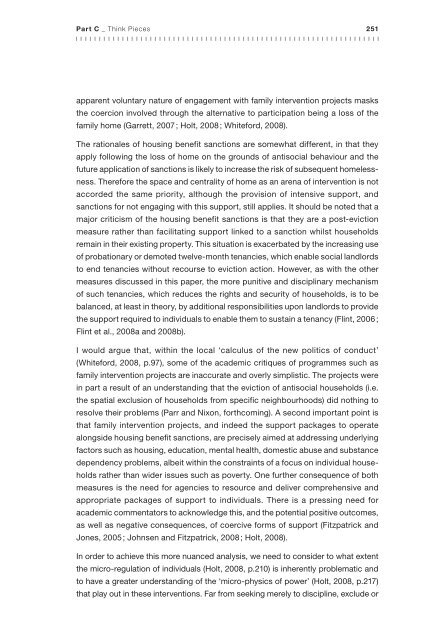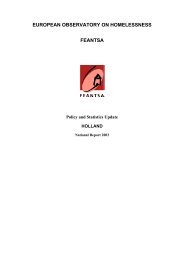Part A - Feantsa - Horus
Part A - Feantsa - Horus
Part A - Feantsa - Horus
You also want an ePaper? Increase the reach of your titles
YUMPU automatically turns print PDFs into web optimized ePapers that Google loves.
<strong>Part</strong> C _ Think Pieces<br />
251<br />
apparent voluntary nature of engagement with family intervention projects masks<br />
the coercion involved through the alternative to participation being a loss of the<br />
family home (Garrett, 2007 ; Holt, 2008 ; Whiteford, 2008).<br />
The rationales of housing benefit sanctions are somewhat different, in that they<br />
apply following the loss of home on the grounds of antisocial behaviour and the<br />
future application of sanctions is likely to increase the risk of subsequent homelessness.<br />
Therefore the space and centrality of home as an arena of intervention is not<br />
accorded the same priority, although the provision of intensive support, and<br />
sanctions for not engaging with this support, still applies. It should be noted that a<br />
major criticism of the housing benefit sanctions is that they are a post-eviction<br />
measure rather than facilitating support linked to a sanction whilst households<br />
remain in their existing property. This situation is exacerbated by the increasing use<br />
of probationary or demoted twelve-month tenancies, which enable social landlords<br />
to end tenancies without recourse to eviction action. However, as with the other<br />
measures discussed in this paper, the more punitive and disciplinary mechanism<br />
of such tenancies, which reduces the rights and security of households, is to be<br />
balanced, at least in theory, by additional responsibilities upon landlords to provide<br />
the support required to individuals to enable them to sustain a tenancy (Flint, 2006 ;<br />
Flint et al., 2008a and 2008b).<br />
I would argue that, within the local ‘calculus of the new politics of conduct’<br />
(Whiteford, 2008, p.97), some of the academic critiques of programmes such as<br />
family intervention projects are inaccurate and overly simplistic. The projects were<br />
in part a result of an understanding that the eviction of antisocial households (i.e.<br />
the spatial exclusion of households from specific neighbourhoods) did nothing to<br />
resolve their problems (Parr and Nixon, forthcoming). A second important point is<br />
that family intervention projects, and indeed the support packages to operate<br />
alongside housing benefit sanctions, are precisely aimed at addressing underlying<br />
factors such as housing, education, mental health, domestic abuse and substance<br />
dependency problems, albeit within the constraints of a focus on individual households<br />
rather than wider issues such as poverty. One further consequence of both<br />
measures is the need for agencies to resource and deliver comprehensive and<br />
appropriate packages of support to individuals. There is a pressing need for<br />
academic commentators to acknowledge this, and the potential positive outcomes,<br />
as well as negative consequences, of coercive forms of support (Fitzpatrick and<br />
Jones, 2005 ; Johnsen and Fitzpatrick, 2008 ; Holt, 2008).<br />
In order to achieve this more nuanced analysis, we need to consider to what extent<br />
the micro-regulation of individuals (Holt, 2008, p.210) is inherently problematic and<br />
to have a greater understanding of the ‘micro-physics of power’ (Holt, 2008, p.217)<br />
that play out in these interventions. Far from seeking merely to discipline, exclude or




